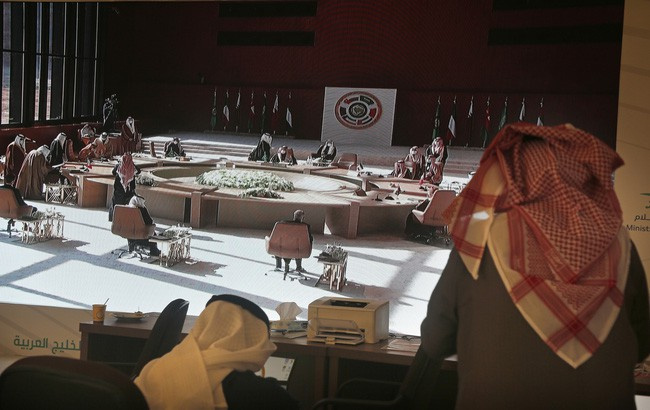News Time
The 41st Annual Gulf Cooperation Council (GCC) meeting began on January 5 in the northwestern Saudi city of Al-Ula. The highlight of the meeting was the peaceful resolution of the contentious situation in the Gulf States through negotiations. Thus, the Al-Ula summit is being called the beginning of a new era in the Arab states of the Gulf. The meeting was also attended by Emir of Qatar Sheikh Tamim bin Ahmed Al Thani. This has increased Iran’s isolation. According to Reuters and World News, the credit goes to Jared Kushner, the special adviser to US President Donald Trump on the Middle East. This is the Qatari emir’s first visit to Saudi Arabia since the crisis in the Gulf States. The Al-Ula Gulf Cooperation Council conference is the first step and further reconciliation steps have yet to be determined. The agreement is very important. The agreement does not mention the Muslim Brotherhood, the largest people’s party in the Gulf States, which was at the center of Saudi-Qatari tensions. Is this an agreement that the Muslim Brotherhood ignored? This led to tensions between Egypt and Qatar.
On June 5 last year, Saudi Arabia, Bahrain, the United Arab Emirates and Egypt cut ties with Doha, accusing Qatar of supporting terrorism and promoting ties with rival Iran. Doha has denied the allegations. Saudi Arabia and its allies not only imposed sanctions on Qatar but also made 13 demands for the resumption of relations. Kuwait was trying to mediate between the parties. The dispute with Saudi Arabia and the UAE’s neighboring Gulf state of Qatar began in June 2017, with some other states supporting Saudi Arabia joining the boycott of Qatar. He alleged that Qatar was involved in sponsoring terrorism and had close ties with Iran. The boycott included the cancellation of economic and diplomatic ties with Qatar and the banning of air, land and sea routes. Qatar has repeatedly denied the allegations at every forum. The United States and Kuwait have made great efforts to reconcile. But the Royal United Services Institute, an international think tank, says the credit for the peace deal in the Arab states of the Persian Gulf also goes to the Trump administration. That’s fine too. The Arab world fears the reduction of US forces in the region, the growing power of the Taliban in Afghanistan and the growing influence of Iran, while also knowing Israel’s technological superiority. Because of this situation, the Arabs feared that it would be destroyed, and that their kingdom would end.
Efforts by the Emir of Kuwait began in October 2020, but were strongly supported by President Trump’s son-in-law and Middle East envoy Jared Kushner visited the Gulf countries in December 2020. Meanwhile, Saudi Crown Prince Mohammed bin Salman and Jared Kushner met in New Saudi Arabia. The question is why hasn’t Jared Kushner been in the White House for the past four years trying to resolve the dispute between Saudi Arabia and Qatar? What is the reason for the idea of reconciling them in Riyadh and Doha? Its sole purpose may be to complete the signing of the Ibrahim Accord with Qatar before January 20.
It is important to remember that Jared Kushner, the special adviser to US President Donald Trump on the Middle East, or Joe Biden, has no interest in Muslim Brotherhood. Countries that boycotted Qatar three years ago have accused Qatar of financing extremists and failing to support efforts to isolate Iran. Now the purpose of friendship with Qatar is to unite the Arabs against Iran alone and against Pakistan. President Trump has long sought to resolve the Saudi-Qatar dispute so that he can successfully implement his full-fledged policy of pressure against Iran, and it will not be easy for incoming President Joe Biden to reverse these measures.
In this whole situation, there are now two countries in the world that are facing economic sanctions from the United States, including Iran and North Korea. As relations between Qatar and Saudi Arabia resumed, Iranian forces seized a South Korean tanker loaded with 7,200 tons of chemical oil in the Strait of Hormuz in the Persian Gulf. The tanker has been delivered to Bandar Abbas port. Tehran wants its frozen assets to be opened in South Korean banks due to US sanctions. South Korea’s foreign ministry has demanded that the plane be released as soon as possible. But it has not yet commented on Iran’s allegations that the tanker was chemically contaminating Gulf waters. All this comes at a time when South Korea’s Deputy Foreign Minister is due to visit Tehran. The US withdrawal from the nuclear deal has upset Iranian businesses. The US Navy’s Fifth Fleet in Bahrain says it is aware of the developments and is monitoring the situation. If this crisis creates a state of war, then it will not be difficult or impossible to stop the world war.




